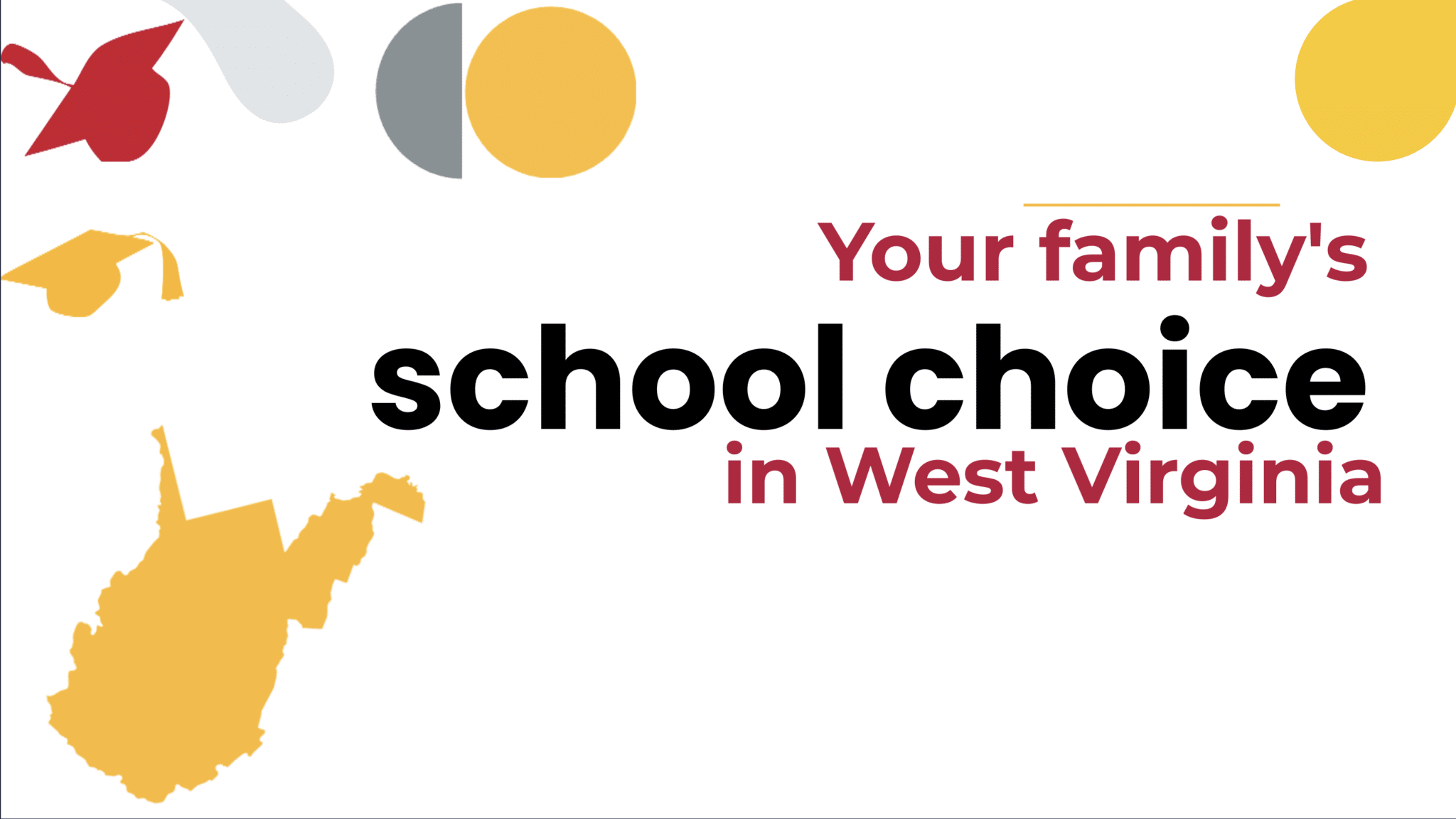Choosing a school? You’ve got options.
“What are my school choices in West Virginia?” It’s a great question. There are a variety of options available for West Virginia families. Knowing these options can help you find a learning environment where your child is actively learning and growing.
In West Virginia, families can choose from traditional public schools, public charter schools, public magnet schools, private schools, online learning, homeschooling, and microschooling and mix-and-match learning.
Looking for special education options? You can learn what special education services are available in West Virginia at the Ultimate Guide to Special Education.

- Traditional Public Schools
- Public Charter Schools
- Public Magnet Schools
- Private Schools
- Online Schools
- Homeschool
- Microschooling
West Virginia Traditional Public Schools
Most West Virginia families choose traditional public schools (90.6% K-12 students), which are operated by school districts, free to attend, open to all students, and funded by taxpayers. Did you know that, on average, West Virginia spends $13,059 per public school student each year? You can search your school’s spending and that of nearby schools at Project Nickel.
West Virginia expanded its public school open enrollment policies in 2023. Open enrollment refers to whether parents can send their children to any public school, regardless of where it is located. Now, West Virginia county boards must establish open enrollment policies and schools cannot charge tuition for transfer students. There are just a few situations in which a transfer request may be denied, such as when there is lack of capacity in the student’s grade level, or when the student has previously been expelled.
Open enrollment is an important way that parents have access to a broader variety of public schools; if you would like to participate in open enrollment, contact your school district to learn more.
For a real-world example of open enrollment, check out Wayne County Schools’ transfer application form. Find out more about public schools in your state at the West Virginia Department of Education. You can also learn more about open enrollment at “Public Schools Without Boundaries: A 50-State Ranking.”
West Virginia Charter Schools
Like traditional public schools, charter schools are public, free, and usually have no requirements for entry. What distinguishes charter schools is that they have extra freedom to innovate with learning methods. Public charter schools are accountable to authorizing bodies (like school districts or colleges) for results.
West Virginia passed legislation authorizing charter schools in 2019. In 2021, the state passed a law creating a new authorizer for charter schools. It also expanded the number of charter schools that could be established in a three-year period from three to 10 schools and allowed for up to two statewide virtual charter schools.
Excitingly, West Virginia now has five charter schools open to students. These include three brick-and-mortar schools: Eastern Panhandle Preparatory Academy in Jefferson County, West Virginia Academy in the greater Morgantown area, and the Workforce Initiative for Nurses (WIN Academy) in the Kanawha Valley. Two virtual charter schools are also available: Virtual Prep Academy and West Virginia Virtual Academy. More charter options may be on the way; two new schools are authorized to open in fall 2024!
Each school has a charter which explains the school’s purpose and what specific community need it serves, whether that be providing a nursing degree program like WIN Academy or offering a rigorous, literacy-based curriculum. If there are more families seeking admittance to a charter school than there are seats, a lottery system (like drawing random names out of a hat!) is usually used to determine admittance.
Free transportation may be available to some students who attend charter schools in West Virginia. Students with special needs and an Individualized Education Program (IEP) and students facing homelessness are eligible for transportation assistance.
West Virginia Magnet Schools
Magnet schools are free public schools that allow kids to narrow in on a specific learning track, such as engineering or the performing arts. At a magnet school, all the subjects are taught through the lenses of that specific track. West Virginia has a handful of magnet schools scattered throughout the state, and these might be a good option if your child learns best by focusing in on a subject they are passionate about. For example, you can read about some of the magnet choices in the Kanawha County Schools. And in Berkeley County Schools, Howe Hall Arts Infused Magnet School offers students learning through the arts. You can contact your school district to see if there are any magnet choices near you.
West Virginia Private Schools
Families in West Virginia can also consider private schools, nonpublic schools that charge tuition. Private schools may offer a unique curriculum, smaller class sizes, or a faith-based tradition. West Virginia’s private schools come in all shapes and forms, from religious schools to schools designed for children with special needs.
There are more than 100 private schools across the state of West Virginia. The average tuition for private schools in the state is $6,358 for elementary schools and $6,617 for high schools.
In 2021, West Virginia created the Hope Scholarship program, which allows students currently enrolled in public school or about to enter kindergarten to use their education tax dollars for private school tuition, tutoring, educational therapy, or other learning expenses. More than 5,000 (2.2%) students have been awarded Hope Scholarships for the 2023-2024 school year. The Hope Scholarship amount is currently $4,488.
In 2023, West Virginia passed a law making it easier for Hope Scholarship students and other non-traditional students to participate in extracurriculars at their local public school. You can hear stories of the Hope Scholarship’s impact on private schools, as well as stories of other learning choices in West Virginia, at the We Have Hope podcast.
Learn more at Private School Review: West Virginia.
West Virginia Online Learning
Whether your child wants to accelerate his or her learning or needs a quieter environment in which to focus, you may be interested in giving virtual school a try. In West Virginia, each district is required to offer a full-time virtual program for students in grades 6-12.
West Virginia public school students can access part-time or full-time online learning for free through the West Virginia Virtual School. Enrollment takes place through a student’s local school district, which may set guidelines and determine the number of courses a student can take. Non-public and homeschool students can access the virtual courses by enrolling as a part-time student in their local school. Fees apply for summer online courses, and in some other cases.
There are also two virtual charter schools open to West Virginia students statewide. These schools are the Virtual Preparatory Academy of West Virginia and West Virginia Virtual Academy, which has a career-technical focus.
Finally, in some cases, districts have developed their own virtual offerings, like Kanawha County Schools Virtual School or Berkeley County Virtual School.
To read more about online learning in West Virginia, check out the Digital Learning Collaborative’s state profile.
West Virginia Homeschooling
West Virginia families can also choose to homeschool, which allows for high levels of customized learning and flexibility. All 50 states allow the process of parents educating students at home.
In West Virginia, 4.4% of K-12 students are homeschooled. Notice of your decision to homeschool if required either by seeking school board approval or by submitting a notice of intent. This notice of intent is required before you begin homeschooling or when moving to a new county. It is recommended that you formally withdraw from your public school so your student is not marked truant.
The state requires homeschooling parents to teach certain subjects, and also may require some level of assessment of homeschoolers. Note that, in some cases, homeschoolers in West Virginia are still eligible to participate in sports or activities at their local public school. Additionally, West Virginia has strong statutory language advocating for a student’s right to part-time enrollment. With approval from their county board, a homeschooler can take a course at a local public school.
While misinformation about homeschooling has recently spread in a couple of West Virginia counties, the truth is that homeschool students in West Virginia receive credit, diplomas, and transcripts recognized by state law. Find more resources about homeschooling in West Virginia at the Home School Legal Defense Association, or join the state’s largest Facebook group for homeschoolers.
West Virginia Microschools and Mix-and-Match Learning
Today, many West Virginia families are mixing and matching school options to come up with new ways to personalize education. Microschools are one of these ways. A microschool refers to students gathering together in a small group – with adult supervision – to learn, explore, and socialize. Microschools can take a variety of shapes and legal forms, from homeschoolers coming together at an enrichment center to a private school committed to small classrooms. What microschools share in common is a commitment to small-group learning, close-knit relationships, and an emphasis on children as individual learners.
Here are a few examples of innovative education options in West Virginia:
- The Midian Leadership Project in Charleston aims to develop community leaders through holistic educational and social support and sports-related programming for young people ages 10 and up. The project hopes to expand into a small private school for boys.
- City on a Hill in Fairmont is a microschool aiming to provide excellent academics with a Biblical worldview and focus on servant leadership.
- Vandalia Community School in Charleston draws on Montessori principles and outdoors learning for its small-group learning experience.
- Eyes and Brains Stem Center is a microschool located in Elkins that fosters critical thinking building and STEM-based learning.
- MicroschoolingWV is West Virginia’s local partner of the National Microschooling Center.
- Expression Prep Academy, starting in Huntington, is a microschool that emphasizes parent partnerships and critical thinking skills.
In most states, microschooling is more of a mentality than a legal distinction. Often, families participate in microschooling while homeschooling or being enrolled in a private school or online school. However, in 2022, West Virginia became one of the first states to sign official definitions of learning pods and microschools into law, distinguishing them from other types of schooling. According to the bill, a learning pod in the state is ““a voluntary association of parents choosing to group their children together to participate in their elementary or secondary academic studies as an alternative to enrolling in a public school, private school, homeschool, or microschool.”
West Virginia law defines a microschool as “a school initiated by one or more teachers or an entity created to operate a school that charges tuition for the students who enroll and is an alternative to enrolling in a public school, private school, homeschool, or learning pod.”
In West Virginia, families participating in learning pods or microschools are exempt from compulsory school attendance, but must meet certain requirements. For example, parents must notify the county superintendent or county board of their intent to participate in a learning pod or microschool, and students must complete annual assessments that are submitted to the county superintendent. With approval from their county board, students participating in a learning pod or microschool in West Virginia may participate in part-time classes at their local school.
Search for Schools Near Me
Microschooling and Mix-and-Match Learning
How can it empower parents and help kids achieve their dreams?
7 Step Guide
Tips to help you find a school where your daughter or son will learn, succeed, and be happy.
Education Resources for
West Virginia Parents
For additional information about school choices in West Virginia, visit these resources:
Every state is different when it comes to school choice options.
Sign up below to get a detailed comparison:
"*" indicates required fields
